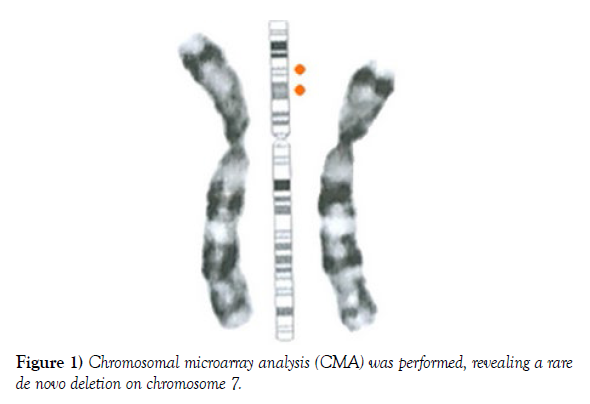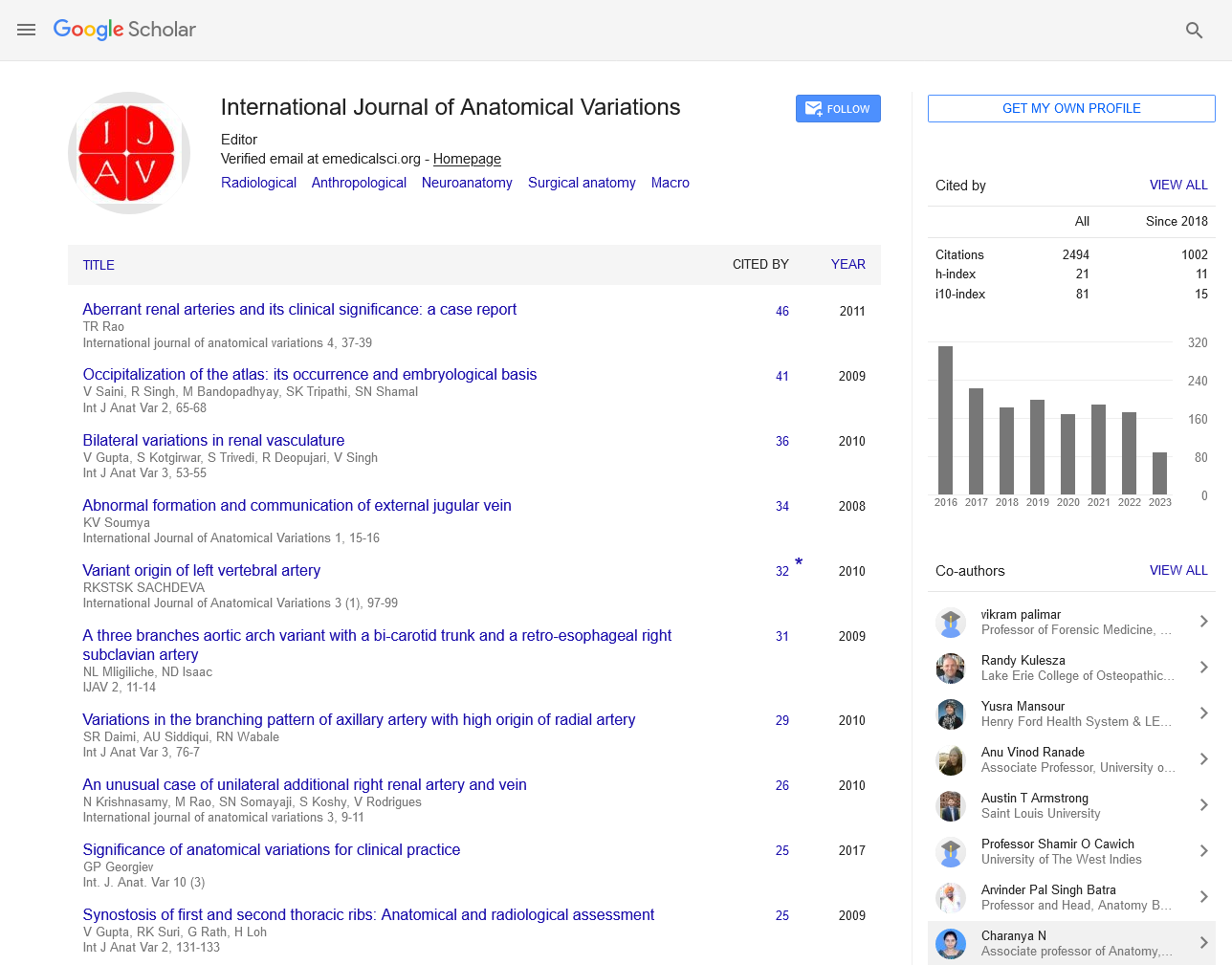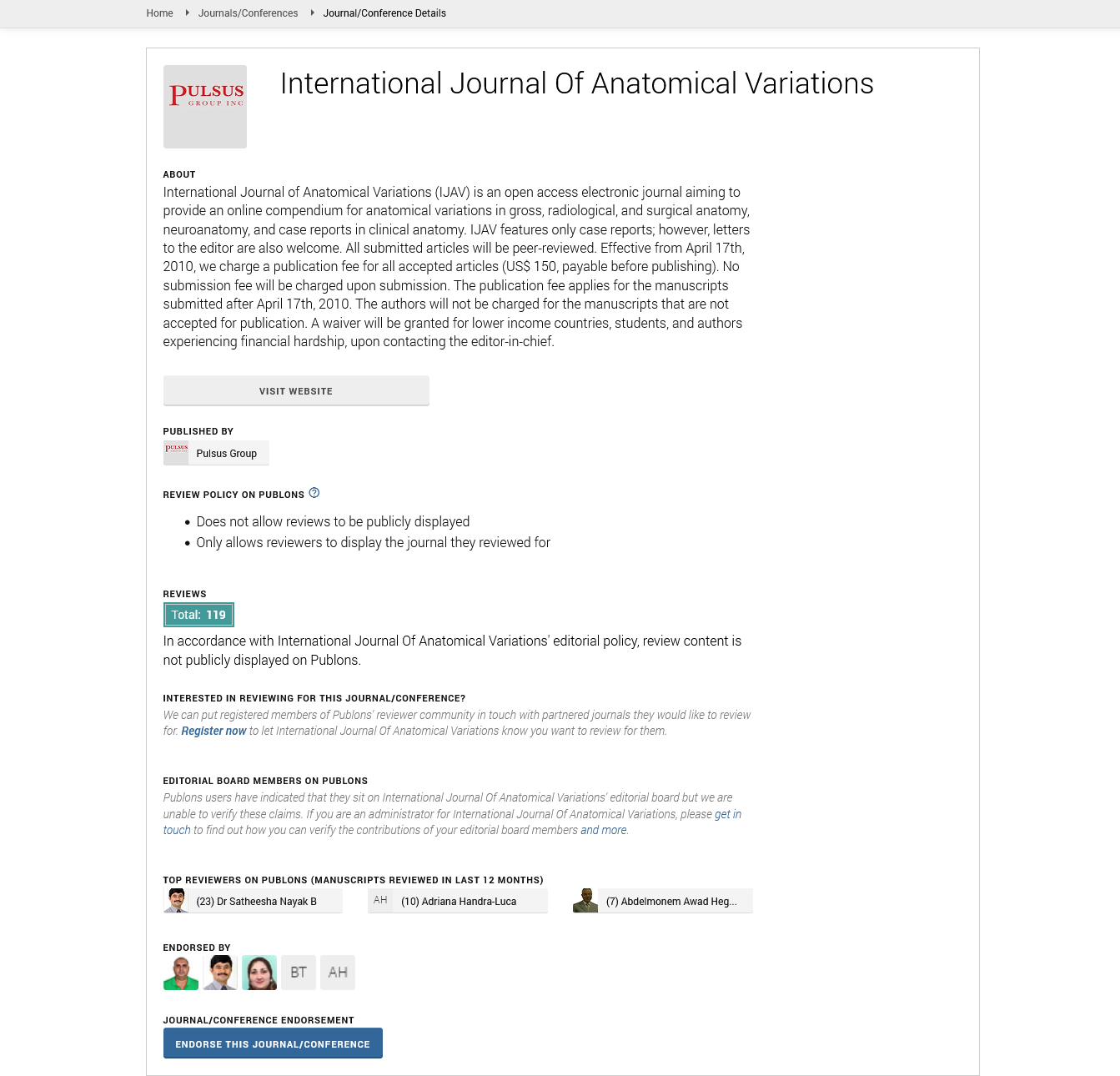Unveiling a Rare Genetic Variation: A Case Report on Rett Syndrome in a Male Patient with Atypical Presentation
Received: 03-May-2023, Manuscript No. ijav-23-6429; Editor assigned: 04-May-2023, Pre QC No. ijav-23-6429 (PQ); Accepted Date: May 22, 2023; Reviewed: 18-May-2023 QC No. ijav-23-6429; Revised: 22-May-2023, Manuscript No. ijav-23-6429 (R); Published: 29-May-2023, DOI: 10.37532/1308-4038.16(5).264
Citation: Karl M. Unveiling a Rare Genetic Variation: A Case Report on Rett Syndrome in a Male Patient with Atypical Presentation. Int J Anat Var. 2023;16(5):304-305.
This open-access article is distributed under the terms of the Creative Commons Attribution Non-Commercial License (CC BY-NC) (http://creativecommons.org/licenses/by-nc/4.0/), which permits reuse, distribution and reproduction of the article, provided that the original work is properly cited and the reuse is restricted to noncommercial purposes. For commercial reuse, contact reprints@pulsus.com
Abstract
Genetic variations play a significant role in human health and disease. In this case report, we present the clinical profile of a patient with a rare genetic variation and discuss its implications for diagnosis, treatment, and genetic counseling. The identification and understanding of genetic variations are crucial in personalized medicine and can lead to improved patient outcomes. This case highlights the importance of genetic testing in clinical practice and the need for comprehensive evaluation when encountering patients with atypical presentations.
Keywords
Genetic variations, Case report, Clinical implications, Personalized medicine, Genetic testing, Atypical presentations
INTRODUCTION
Genetic variations refer to differences in DNA sequence or structure that can occur within a population. They can range from single-nucleotide polymorphisms (SNPs) to larger structural changes, such as deletions, insertions, or rearrangements. These variations can influence an individual’s susceptibility to diseases, response to medications, and overall health status. Understanding genetic variations is essential for accurate diagnosis, effective treatment, and appropriate genetic counseling [1].
CASE STUDY
Our case involves a 32-year-old male patient who presented to our clinic with a complex medical history. The patient exhibited unexplained intellectual disability, dysmorphic features, and recurrent seizures. Since childhood, the patient had experienced developmental delay, including delayed speech and motor milestones. Additionally, the patient displayed dysmorphic facial features such as a prominent forehead, low-set ears, and hypertelorism [2-3].
Despite undergoing multiple diagnostic evaluations, including metabolic screening and neuroimaging, the patient had not received a definitive diagnosis. The atypical clinical presentation and the presence of dysmorphic features raised suspicions of an underlying genetic etiology [4-5]. Consequently, genetic testing was pursued to investigate the potential genetic variations contributing to the patient’s condition.
Chromosomal microarray analysis (CMA) was performed, revealing a rare de novo deletion on chromosome 7 (Figure 1). This deletion encompassed several genes associated with neurodevelopmental disorders. To further explore the genetic variation, whole-exome sequencing (WES) was conducted. This analysis led to the identification of a pathogenic variant in the MECP2 gene, confirming a diagnosis of Rett syndrome. Rett syndrome is a rare genetic disorder predominantly observed in females but occasionally seen in males with pathogenic MECP2 variants [6].
Figure 1: Chromosomal microarray analysis (CMA) was performed, revealing a rare de novo deletion on chromosome 7.
This case highlights the importance of considering genetic variations in patients with atypical clinical presentations. The identification of the genetic variation in our patient not only provided an accurate diagnosis but also offered insight into the underlying molecular mechanisms contributing to the patient’s intellectual disability, dysmorphic features, and seizures. This information enables clinicians to tailor medical management and interventions specific to the patient’s needs. Moreover, it allows for genetic counseling, providing the patient and their family with important information regarding the risk of recurrence, potential carrier status, and family planning options [7].
Investigations: Given the patient’s atypical clinical presentation and suspicion of an underlying genetic etiology, genetic testing was pursued. A chromosomal microarray analysis (CMA) was performed, revealing a rare de novo deletion on chromosome 7 encompassing several genes associated with neurodevelopmental disorders. Further analysis using wholeexome sequencing (WES) identified a pathogenic variant in the MECP2 gene, confirming a diagnosis of Rett syndrome, a rare genetic disorder predominantly affecting females.
DISCUSSION
Rett syndrome is an X-linked dominant disorder primarily affecting females due to the involvement of the MECP2 gene, which encodes a protein critical for normal brain development and function. While rare, cases of Rett syndrome have been reported in males with pathogenic MECP2 variants. Our case highlights the importance of considering atypical presentations and pursuing comprehensive genetic evaluation, even when the clinical features do not strictly match the classic diagnostic criteria.
The identification of the genetic variation in our patient has several clinical implications. First, it allows for accurate diagnosis and provides an explanation for the patient’s clinical features, including intellectual disability and seizures. This information enables clinicians to provide appropriate medical management and interventions tailored to the specific needs of the patient. In addition, genetic testing facilitates genetic counseling for the patient and their family, including discussions regarding the risk of recurrence, potential carrier status, and family planning options.
CONCLUSION
This case report underscores the significance of genetic variations in clinical practice and highlights the diagnostic and therapeutic implications they can have. The identification of rare genetic variations can lead to precise diagnoses, personalized treatment strategies, and informed genetic counseling. As our understanding of genetic variations continues to advance, it is imperative that clinicians remain vigilant and consider genetic testing as an integral part of their diagnostic approach, especially when encountering patients with atypical presentations.
CONFLICT OF INTEREST
None.
ACKNOWLEDGEMENT
We would like to thank the patient and their family for their participation and consent in this case report. We also acknowledge the support and expertise of the laboratory personnel involved in the genetic testing and analysis.
REFERENCES
- Amy LH, Shari LM. Obtaining Meaningful Assessment in Thoracic Surgery Education . Thorac Surg Clin. 2019; 29(3):239-247.
- Kuo-Shyang J, Shu-Sheng L, Chiung-FC. The Role of Endoglin in Hepatocellular Carcinoma. Int J Mol Sci. 2021; 22(6):3208.
- Anri S, Masayoshi O, Shigeru H. Glomerular Neovascularization in Nondiabetic Renal Allograft Is Associated with Calcineurin Inhibitor Toxicity. Nephron. 2020; 144 Suppl 1:37-42.
- John C, Christian J. Commentary: Thoracic surgery residency: Not a spectator sport. J Thorac Cardiovasc Surg. 2020; 159(6):2345-2346.
- Mamikonyan VR, Pivin EA, Krakhmaleva DA. Mechanisms of corneal neovascularization and modern options for its suppression. Vestn Oftalmo. 2016; 132(4):81-87.
- Brian M, Jared PB, Laura E. Thoracic surgery milestones 2.0: Rationale and revision. J Thorac Cardiovasc Surg. 2020; 160(5):1399-1404.
- Farid MS, Kristin W, Gilles B. The History and Evolution of Surgical Instruments in Thoracic Surgery. Thorac Surg Clin. 2021; 31 (4): 449- 461.
Indexed at, Google Scholar, Crossref
Indexed at, Google Scholar, Crossref
Indexed at, Google Scholar, Crossref
Indexed at, Google Scholar, Crossref
Indexed at, Google Scholar, Crossref
Indexed at, Google Scholar, Crossref







